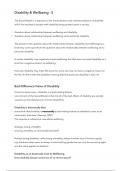Disability & Wellbeing - 5
The Social Model is a response to the medicalisation and institutionalisation of disability
which has resulted in people with disability being pushed aside in society.
1. Question about relationship between wellbeing and disability
2. Question about relationship between wellbeing and a particular disability
The answer to the question about the relationship between disability and wellbeing (as a
kind) may come apart from the question about the relationship between wellbeing and a
particular disability.
A certain disability may negatively impact wellbeing, but that does not entail disability as a
kind has a negative relation to wellbeing.
Particular disability may make life worse for some, but may not have a negative impact on
the life of others with that disability meaning that that particular disability is also not
Bad-Difference Views of Disability
Common-sense view = disability is a bad-making feature
one criticism of the Social Model is that not all of the bad effects of disability are socially
caused e.g. the physical pain of some disabilities
Disability is Intrinsically Bad
some think that disability is necessarily a bad-making feature as disabled counts as an
intrinsically ‘bad state’ (Harman, 2007)
This requires a substantive view about wellbeing
Analogy: being unhealthy
is being unhealthy an intrinsically bad state?
Perhaps being disabled, unlike being unhealthy, always involves loss of intrinsic goods.
e.g. blindness does seem to always involve lacking goods that can only be access by sight,
and the same applies to deafness
Disability as an Automatic Cost to Wellbeing
Does disability always involve loss of an intrinsic good?
, Disability often involves inability i.e. lacking in some goods
e.g. blindness / deafness = lack of goods that can only be access by sight / hearing is
blindness/deafness an automatic cost to wellbeing?
Proponents of the bad-difference view argue that disability is an automatic cost to
wellbeing.
However, there are potentially goods which are only accessible via a lack of some other
good e.g. the ability to enjoy music via feeling vibrations comes with the inability to enjoy
music via the sense of hearing.
deafness involves the loss of one medium of appreciation of the art of music, but this is
just one medium among many and so may not entail an automatic loss of intrinsic good
albeit a less frequently used medium of appreciation of art, it is still a medium which
facilitates the enjoyment of an intrinsic good
just different, not bad mere-difference / value-neutral
Denying that disability is an automatic cost to wellbeing does not require one to think that
with disability comes some special / enhanced ability i.e. a ‘super-crip’ view (Barnes, 2016)
people with disabilities just access such goods in a different way, or may even experience
different goods all together which are only accessible via their inability
Disabled People as Predictive of Lower Wellbeing
Disabled People are, on average, worse-off than non-disabled people
however, is this only true because of ableism?
Analogy: homophobia and other prejudices
most people would not say there is anything intrinsically bad about being gay, rather the
negative impacts on wellbeing associated with being guy are a result of social prejudices
Disability Causes Lower Level of Wellbeing even without Ableism
If society was fully accepting of disabled people, it would still be the case that for any
given disabled person x and any arbitrary non-disabled person y, such that x and y are in
relatively similar personal and socio-economic circumstances, it is likely that x has a lower
level of wellbeing than y in virtue of x’s disability. (Barnes, 2016:65)
This view requires us to:
1. Consider a society without ableism and prejudice (and with all reasonable
accommodations)
2. Hold fixed features that are relevant to wellbeing that are not related to disability





